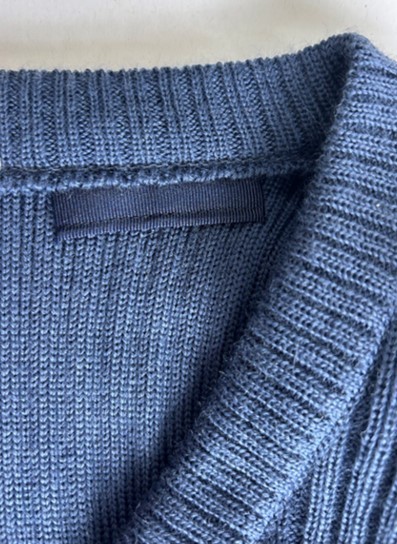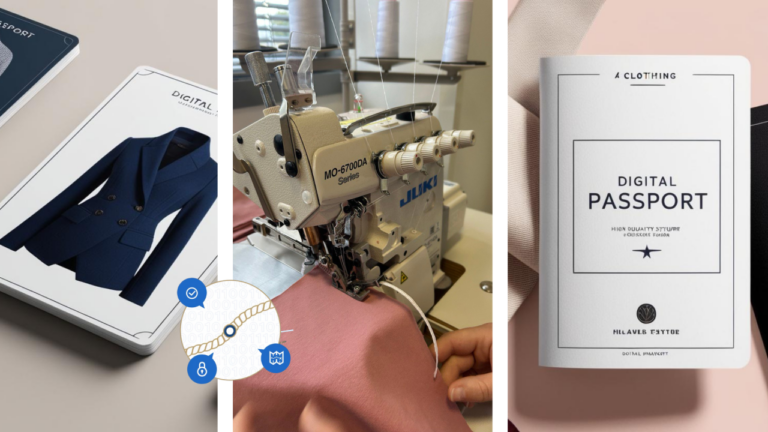The fashion industry is undergoing a major shift as brands face growing challenges in managing inventory, reducing waste, and embracing circular business models such as rental and second-hand sales. With increasing consumer demand for sustainable fashion and new regulations like the Digital Product Passport (DPP) on the horizon, retailers need solutions that go beyond traditional inventory management. RFID technology, embedded directly into textiles, is emerging as a game-changer, enabling brands to streamline operations while supporting sustainability initiatives.
For years, RFID has been associated with warehouse and store inventory management, allowing retailers to track products efficiently and reduce shrinkage. However, its impact goes much further. By integrating RFID tags directly into garments, brands gain real-time visibility across the entire lifecycle of a product—from manufacturing to resale and recycling. This transformation is opening new doors for the circular economy, making second-hand retail, rental services, and recycling more seamless than ever.
Optimizing retail efficiency: the power of RFID in inventory management
Retailers struggle with inefficient stock management, misplaced inventory, and time-consuming manual processes. Traditionally, store employees spend hours scanning barcodes or manually counting items, leading to inaccuracies and lost sales opportunities.
With advanced RFID capabilities such as mass reading in stacking, large volumes of garments can be scanned simultaneously, drastically improving operational efficiency in logistics, inventory management, and recycling processes.
When RFID is seamlessly embedded into garments using Primo1D’s E-Thread™ RAIN RFID innovative technology, tracking becomes even more effortless. Unlike traditional RFID stickers or labels that can be detached or tampered with, E-Thread™ is woven directly into textiles, making it both discreet and permanent. This ensures that products remain trackable throughout their lifecycle, offering long-term benefits beyond just store-level inventory management.

The exemple of E-Thread™ RFID tag integrated in the pipeline of a clothing item
For retailers, this translates into fewer stock discrepancies, optimized replenishment, and a smoother shopping experience. Staff can quickly locate items, reduce stockouts, and minimize overproduction, ultimately improving profitability while reducing waste. In a fast-paced industry where real-time responsiveness is key, RFID-enabled inventory management provides a crucial competitive advantage.
The rise of second-hand fashion: why RFID is essential for resale
The second-hand fashion market is booming, with an expected growth rate of +24% by 2030, far outpacing traditional retail. As brands and retailers enter the resale space, they face new operational challenges, including product authentication, condition verification, and seamless stock tracking across resale platforms. RFID technology eliminates these hurdles by enabling automated authentication and real-time traceability.
By embedding E-Thread™ RFID tags into garments, brands ensure that each product carries a unique digital identity that can be accessed at any point in the resale process. This allows resale platforms and retailers to verify a garment’s authenticity, track its condition, and update stock without manual intervention. Consumers also benefit, as they can scan items to view detailed product histories, including fabric composition, previous ownership, and care instructions—building trust and transparency in second-hand shopping.
Additionally, as DPP regulations mandate more detailed product traceability, RFID-equipped garments will become an essential standard for resale platforms looking to comply with sustainability and transparency requirements. Brands that adopt this technology early will be better positioned to capitalize on the resale trend while ensuring compliance with upcoming regulations.
Rental and loss prevention: a new era of sustainable fashion
The fashion rental market is growing rapidly, with more brands offering subscription-based clothing services to appeal to eco-conscious consumers. However, rental services face logistical challenges, including tracking garment returns, preventing loss, and monitoring wear and tear. Traditional tracking methods rely on barcodes, which can fade, detach, or require manual scanning—creating inefficiencies in high-volume rental operations.
RFID solves these challenges by automating the rental workflow. With RFID-embedded garments, rental companies can instantly scan multiple items, track rental history, and receive automated alerts when garments are returned or need repairs. This reduces operational bottlenecks, improves turnaround times, and enhances profitability. Additionally, the durability of E-Thread™ RFID tags ensures that garments remain traceable through multiple rental cycles, even after repeated washing and handling.
Loss prevention is another critical benefit. Traditional rental tracking relies on external labels that can be removed or tampered with. E-Thread™ RFID tags are integrated into the fabric itself, making them impossible to detach without damaging the product. This ensures that rental garments remain accounted for and reduces financial losses due to misplaced or stolen items.
Facilitating recycling and closing the loop
The final step in achieving a circular fashion model is ensuring that garments are properly sorted and recycled at the end of their lifecycle. One of the biggest challenges in textile recycling today is the lack of clear material identification, making sorting processes slow and inefficient. Workers must rely on care labels—often missing or faded—to determine fabric composition, leading to mistakes and contamination in recycling streams.
RFID technology solves this issue by enabling automated, accurate sorting. With E-Thread™ RFID tags, recycling facilities can instantly scan garments and retrieve detailed composition data, ensuring that fabrics are correctly sorted and processed. This improves recycling efficiency, reduces waste, and accelerates the adoption of circular economy principles in fashion.
Moreover, brands that integrate RFID technology demonstrate commitment to sustainability, offering consumers clear end-of-life options for their garments. Whether through take-back programs, repair services, or resale, RFID-enabled traceability ensures that textiles remain in circulation longer, reducing overall environmental impact.
A smarter, more sustainable future for fashion
The fashion industry is at a turning point. As sustainability expectations rise and regulations tighten, brands and retailers must rethink their approach to inventory management, resale, rental, and recycling. RFID technology, when embedded directly into textiles, provides an all-in-one solution that enhances operational efficiency, facilitates compliance, and supports the shift toward circular fashion models.
By adopting E-Thread™ RFID tags, brands can optimize retail processes, build trust in second-hand markets, streamline rental operations, and enable efficient recycling. As the industry moves towards greater transparency and sustainability, early adopters of RFID will lead the way, shaping a smarter and more responsible future for fashion.
Want to learn more about how Primo1D’s RFID technology can transform your retail operations? Contact us today and join the future of sustainable fashion.



